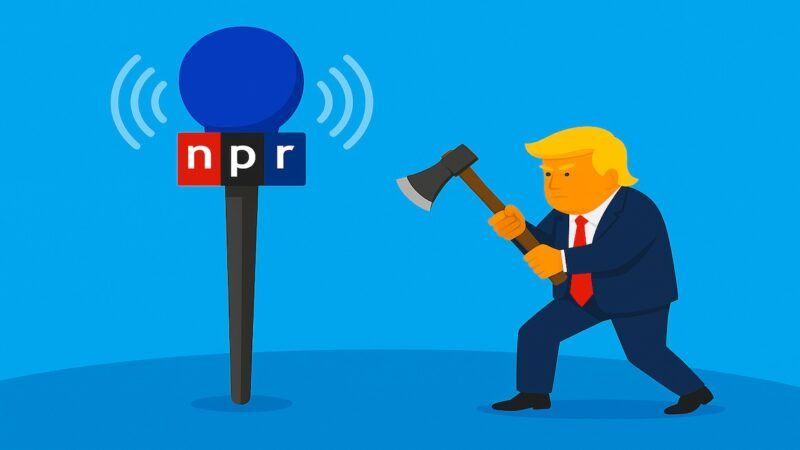Trump Tries To Defund NPR and PBS by Executive Order
A new executive order would keep the Corporation for Public Broadcasting alive while telling it to cut off the two biggest public broadcasting networks. Get ready for a legal fight.

President Donald Trump issued an executive order last night that is supposed to end federal funding for the public TV network PBS and the public radio network NPR. Specifically, he ordered the Corporation for Public Broadcasting (CPB) to stop its direct subsidies to those networks "to the maximum extent allowed by law" and to revise its grants to individual stations to block them from spending taxpayers' money on PBS or NPR programs. The order also instructs all executive agencies to eliminate any flow of funds to the two networks, and it asks the Department of Health and Human Services to investigate whether the networks are guilty of illegal discrimination.
If you're a totebag-hating Tory who wants to kick Daniel Tiger off the dole, you may be in for some disappointment. That phrase "to the maximum extent allowed by law" did not come from nowhere; this move is guaranteed to run into legal trouble. It also seems, on the surface at least, to be bizarrely timed, since Congress is supposed to vote on a rescission bill soon that would cut off the CPB's money anyway.
The biggest legal issue here is pretty simple: The CPB is not a part of the executive branch, so it isn't clear how the president would have the authority to issue those demands. I don't mean that it is an "independent agency" like the Federal Trade Commission; I mean that it is not, officially, a government agency at all. The law that established the corporation said it "would not be an agency or establishment of the United States Government." As a statutory matter, it isn't an arm of the federal apparatus.
As a practical matter, of course, the CPB is very much an arm of the federal apparatus—and the Oval Office has a long history of putting pressure on it, going all the way back to the organization's origins under President Lyndon Johnson. And of course, the president nominates new members to the CPB board when their predecessors' terms elapse, though they then have to be confirmed by the Senate. Trump is, in fact, in the midst of a legal fight right now over his attempt to fire three members of the board before their six-year terms expire.
Still, it is not technically a government agency, and its board has been arguing in court that Trump for that reason does not have the right to fire its members willy-nilly. It will surely say the same thing about this new order. I'll be interested to see how the White House defends itself against that line of attack, because I have a hard time imagining a winning legal argument for Trump's approach—and I say that as someone who has been writing for three decades that the government and the CPB should break up.
But the big question here isn't Does the Trump administration have an argument up its sleeve that will wow the judges and let it tell the CPB what to do? The big question is: Wait, wasn't the Trump administration about to send Congress a request for it to rescind the CPB's funding? Why bother with this order at all?
There are all sorts of possible answers to that, from "maybe they don't have the votes in the Senate" to "maybe they think the threat of rescission will give them leverage over the board" to "maybe there's a faction fight in the White House about the best way to proceed" to "maybe Trump just got mad." We'll probably learn more down the road about what's going on behind the scenes. The important thing to recognize now is that the rescission path is far preferable to the executive-order path—and not just because it avoids those legal problems.
Under the rescission bill, the CPB will lose its federal support but will be free to use its other resources to fund whatever programming it likes. Under the executive order, the CPB will still have federal support and will have to do whatever the White House says. The first approach detaches public media from the federal government but allows them to try to survive as what noncommercial broadcasting originally was—a part of civil society. The second approach actually tightens the feds' control over public media's biggest funder, and it centralizes that control in the hands of whoever happens to be president.
If rescission passes anyway, that won't matter much. But if this is supposed to be a substitute for rescission, it could leave us worse off than before.
